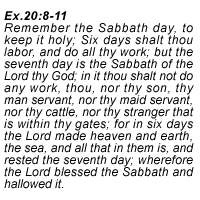
James Durham
The Fourth Commandment
Introduction
Copyright © 1997 Naphtali Press
The Lord in his infinite wisdom and goodness, has so far consulted man’s infirmity, as to sum up his duty in these ten commands, called ten words, that thereby his darkness and dullness by sin, might be helped by an easy abbreviation. The first command therefore contains man’s duty to God in immediate worship, requiring that the only true God should be worshipped. The second stints and limits men to that worship alone which he prescribed. The third commands reverencing of him in all his ordinances, and a reverent manner of going about them.
This fourth points out the time which most solemnly the Lord will have set apart for his worship, that so he, who is both Lord of us, and of our time, may show what share he has reserved as a tribute due to himself, who has liberally vouchsafed on us the rest; which time is not to be understood exclusively, as if he would have only that spent in worship (there being no exclusive determination of exercise of worship, or duration of them in Scripture, that is to say, that they shall be so long and so often, and no longer, no oftener) but that he will precisely have this time as an acknowledgment from us, even as when he gave Adam the use of all the trees in the garden, he reserved one; so when he gives six days to us, he keeps a seventh for himself.
This command is placed in a manner between the two tables, because it is a transition as it were from the one to the other, and contains in it duties of immediate service to God, and of charity towards men, and so in some sort serves to reconcile (if we may speak so) the two tables, and to knit them together, that so their harmony may be the more clearly seen. It is also more largely and fully set down for plurality and variety of expressions and words than any other in either of the tables; yet has it notwithstanding, been in all times in a special manner assaulted and set upon, and endeavors used to overturn it. Satan aiming sometimes to darken the meaning of it; sometimes to loose from the strict tie of observing it, and that not only by old Sabbatarians, anti-Sabbatarians, and corrupt school-men, but even by those whom God has made orthodox in the main; and especially by a generation in these days, who having a hatred at all ordinances, and at all the commands of the decalogue, yet do especially vent it against this command; because in it is contained a main foundation of godliness. As it is wonderfully great presumption for men to assault and set upon God’s authority, even where he has strengthened himself most (as it were), by more full explication, and more large and particular pressing of duty, and forbidding of the contrary sin, as he has done on this command, more than in any of all the rest; so it will be necessary before we can speak to the practical part of piety comprehended in it [Part IV], concerning the sanctification of the Christian Sabbath, or Lord’s Day, either in the negative or positive part of it, to speak doctrinally (for clearing of the precept) to these three:
I. Whether this command is moral, and obliges us in its letter as other commands do.
II. What is the particular morality of it, and the literal meaning of the words.
III. How our Lord’s Day stands in reference to this command, and whether thereby the same sanctification is required as to it, though its institution arise from another ground, than is required to the seventh-day Sabbath?
Somewhat of all these must necessarily be spoken unto, and we begin to speak first of its morality before we speak of its meaning, because all depends on this, both in respect of exposition and practice. For if it is not moral and perpetually binding, it’s not necessary either to explicate it, or to study and press the practice of it. But if it is found to be moral, then no doubt it concerns us, and requires the same moral sanctification of a day now as it did before.
